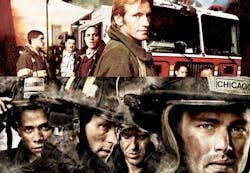I am not one to watch much television, I’ll be the first to admit that. And to prove it, I just finished watching the last episode of "Rescue Me" on Netflix this weekend The finale aired in 2011.
And now, I just started watching "Chicago Fire," the NBC drama, which airs on Tuesday nights, that just started its second season this fall. At least I’m only a year behind that one.
While the similarities between the two shows are striking, I am not going to do a TV critic column. That’s not my job and I wouldn’t be very good at it anyway.
The thing I will comment on is product placement. The average Joe wouldn’t recognize the brand name fire service products featured prominently in the opening credits on Rescue Me, or the logo on the radios and turnout gear used in "Chicago Fire," but the firefighter fans no doubt do notice.
And I am sure that’s what the vendors want. It’s said there are a million firefighters in the United States and there’s a good chance a few hundred thousand are sitting on a couch at home, or at a fire station watching the show. And that’s a good number of impressions for any vendor.
Don’t get me wrong. I’m all for advertising. It’s what pays my salary and has for decades. It’s the bread and butter of publishing and, to some degree, all business, including the business of firefighting.
The use genuine fire service equipment and gear in any dramatic presentation lends a sense of realism to the show – even if the stuff is not always used realistically. And, it’s a good way for manufacturers to show off their products. There have even been magazines on firehouse tables that have made their way in front of the cameras.
I won’t say how many logos and references to well-known fire trade products I have seen in both of the shows, but if you’ve watched any of them, and you’re in the fire service, you know what I am talking about.
As long as the equipment is used properly and represented in a realistic way, I am all for it. One could consider it a coup to get any product on television in a product placement – even if dollars or “promotional considerations” were exchanged. It’s good for the show producers, it’s definitely good for the vendors and manufacturers and, hopefully, it’s good for the firefighting viewers.
It is, however, important to remember that just because Tommy Gavin (aka Dennis Leary) on "Rescue Me," wears a certain kind of turnout gear, uses a certain type of flashlight, or rides a certain rig, it might not be the right stuff for you and your department. It might be exactly what you’re using, or thinking about using, and that’s great. But every department has to do its own research and product evaluation. Due diligence is required, always. Lives depend on it.
If Tommy, from "Rescue Me" or Lt. Matt Casey (aka Jesse Spencer) from "Chicago Fire" uses it, and you use it too, that’s great. It’s one of those fun, coincidental incidents that you can tell your spouse, boyfriend or girlfriend, and maybe your mom, about and they might be impressed. It should not be the singular reason for making the purchase.
I trust that all of us in the fire service are grownups and not impressed by product placements and seemingly endorsements by stars on shows and movies. As seen on TV is not something that should ever govern purchasing decisions.
Like with all advertising, it’s designed to get customers to think about what kinds of items to buy and to plant an impression in the mind – driving us to go check out more about a particular product.
Advertising, like the stuff you probably see surrounding this very column, is a solicitation for you to look at and try the products and, obviously, to eventually buy the product.
Never forget the critically important stuff that has to follow after viewing the ads, like product evaluation, requests for proposals and/or bids, bid evaluation and then the purchase.
Plus there’s always the product familiarization and training that has to follow with any new purchase.
Firefighting, as seen on TV, is cool, to a point. Cop shows are a dime a dozen, but firefighting shows are far and few between. It’s OK to get sucked up into the show story lines, but use caution when basing purchasing decisions on star power alone.
Enough said.






